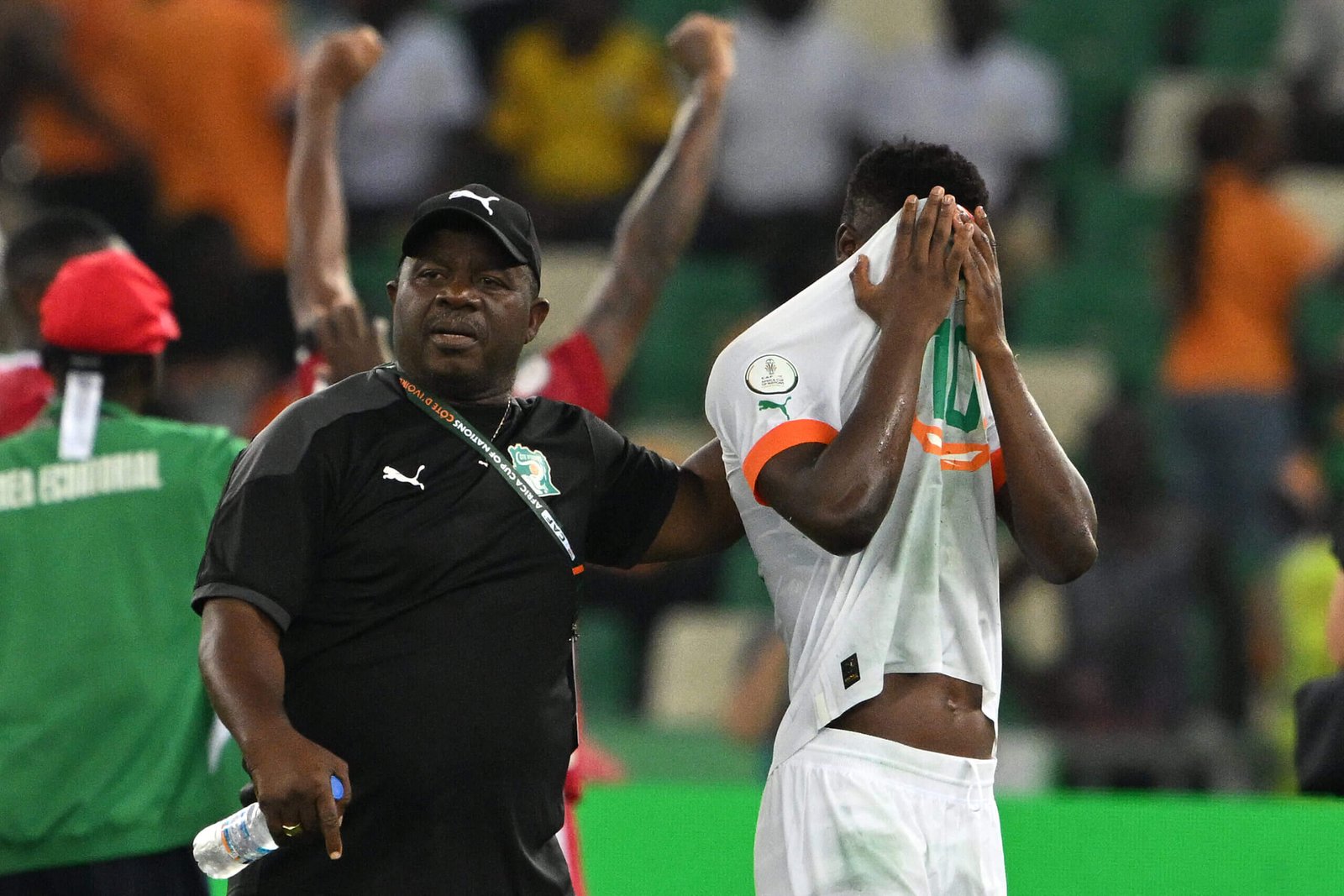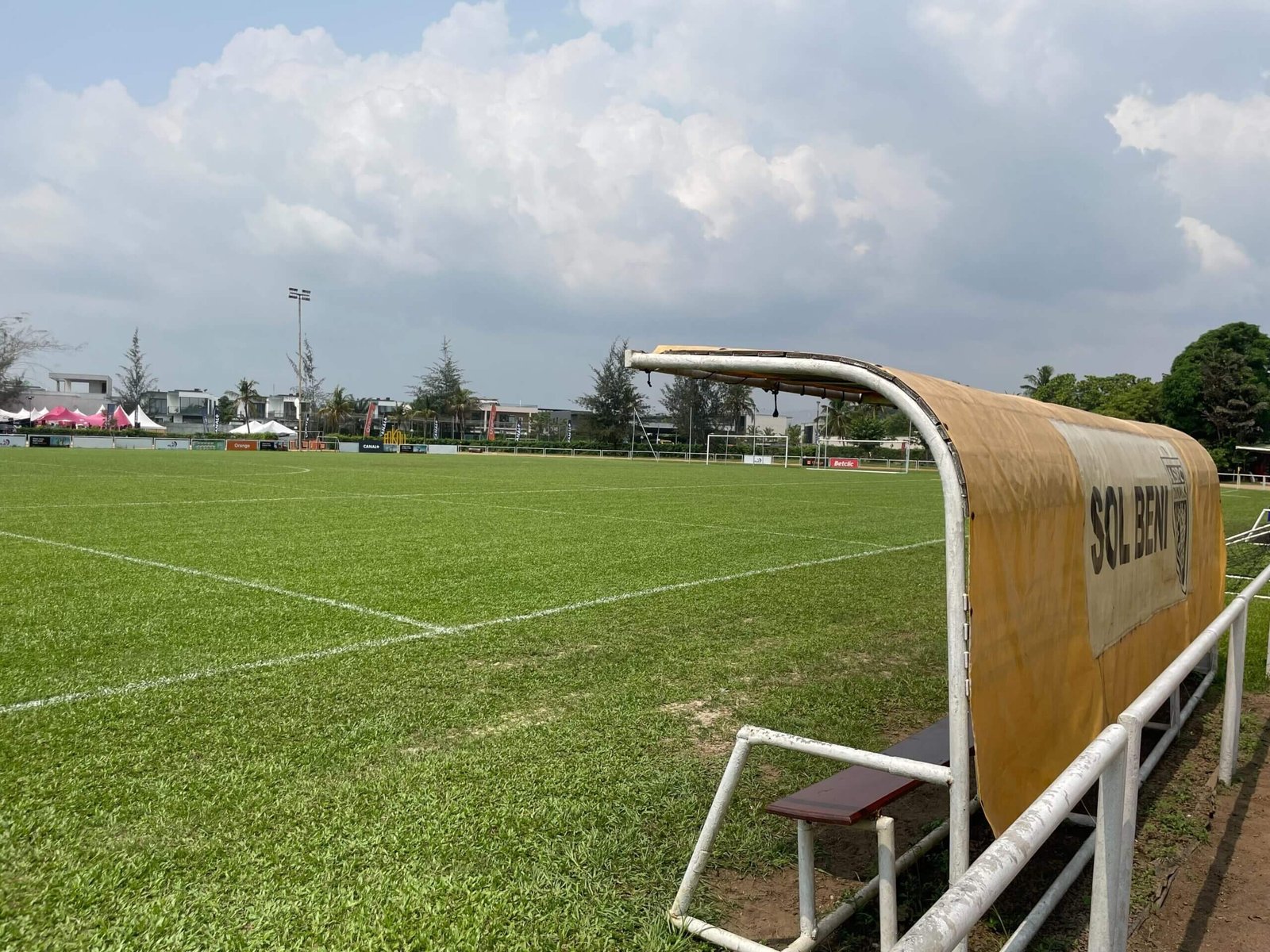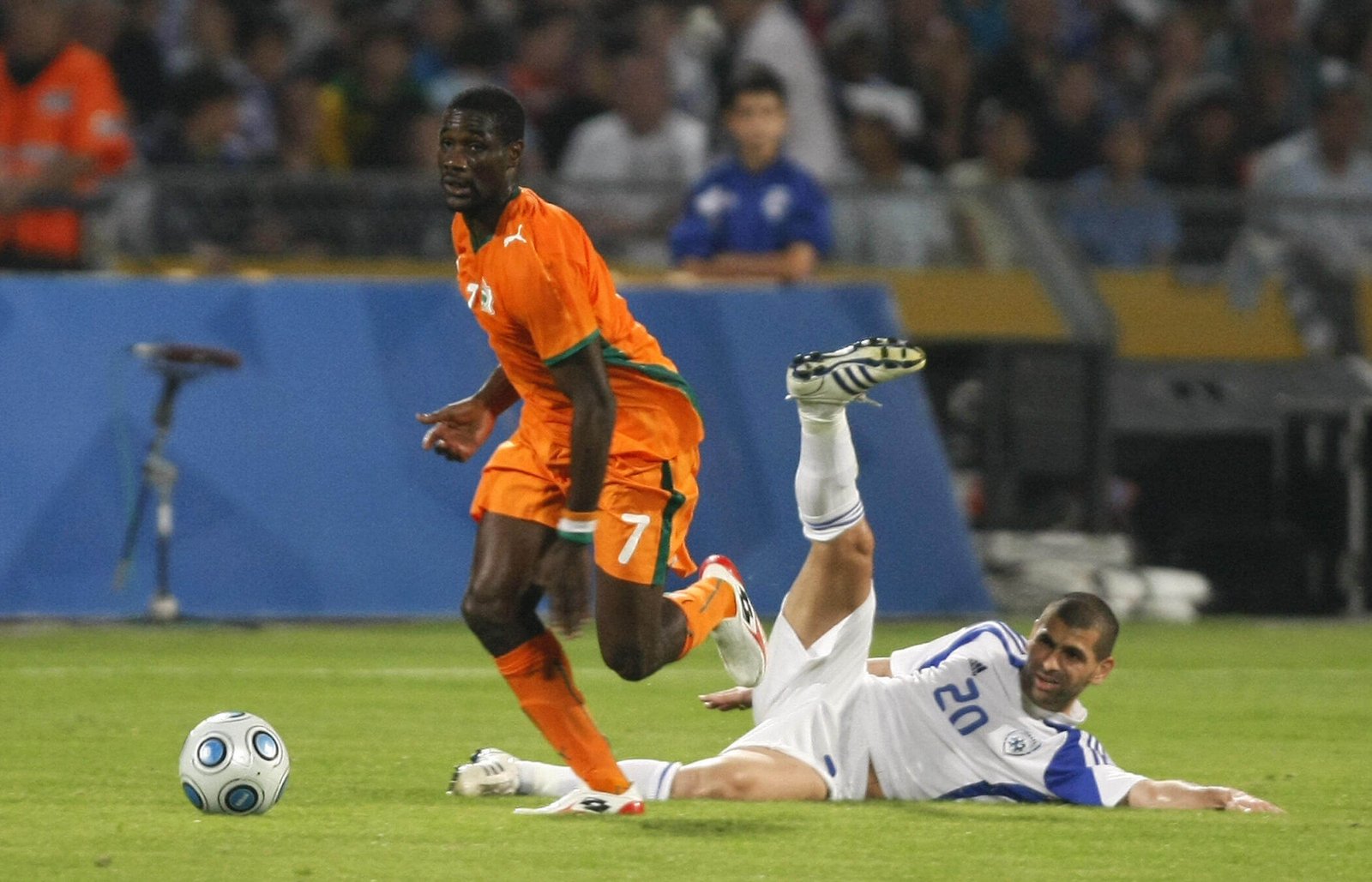On one of the main highways in Treichville, a bustling district in the Ivory Coast’s economic capital Abidjan, people weave in and out of traffic trying to sell you everything you can possibly imagine.
Vendors skirt around the hoods of cars and nimbly sidestep out of the way of motorcycles to offer up sunglasses, pillows, toothpicks, perfumes, footballs, socks, carpets and cameras through small gaps in the windows. Women in traditional dresses glide across the cracked asphalt on sandals to supply you with peanuts, fruit and local delicacies while a man strolls through the gridlocked vehicles pushing a large wooden wheelbarrow.
One man’s face overlooks all of the madness. Sebastien Haller, Ivory Coast’s talisman, is plastered across billboards advertising a range of products. The Borussia Dortmund striker is everywhere in the city — except on the pitch where he is needed the most.
Ivory Coast players help advertise electronics in Abidjan (Jay Harris/The Athletic)
Haller has been prevented from playing so far due to an ankle injury, yet the host nation’s squad still contains Nottingham Forest’s Ibrahim Sangare, former Arsenal winger Nicolas Pepe and Bayer Leverkusen centre-back Odilon Kossounou.
After starting the tournament strongly with a 2-0 victory over Guinea-Bissau, Ivory Coast find themselves in a crisis. They lost 1-0 to Nigeria and were thrashed 4-0 by Equatorial Guinea, which led to manager Jean-Louis Gasset’s dismissal. Nevertheless, the host nation have scraped into the knockout stages, where the holders Senegal await, as one of the best third-placed sides.
An attempt to replace Gasset with Herve Renard, who won the Africa Cup Of Nations with Ivory Coast in 2015, failed on Thursday. Renard is in charge of France’s women’s side and needed permission from their federation (FFF), which was not granted. Ivory Coast’s football association (FIF) denied speaking to Renard when contacted by The Athletic.
It means that ahead of one of their biggest fixtures in decades, Ivory Coast are without a manager and their star player.
The Athletic arrived at the Felix Houphouet Boigny International Airport on Tuesday morning, a few hours after Ivory Coast were humiliated by Equatorial Guinea. It is the biggest defeat they have suffered at home and they became the first host to lose two group stage games at AFCON since it happened to them in 1984.
Fans trudged around in bright orange shirts with glum expressions. They still had a good chance of sneaking into the knockout stages but the mood was sombre. “The elephant is done,” Alex, a local taxi driver, said before quickly changing the topic of conversation.
When The Gambia took a 2-1 lead against Cameroon that evening, patrons of a local bar started running around in the streets celebrating as it meant Ivory Coast would qualify. A few minutes later, Cameroon completed a remarkable comeback to win 3-2. Silence took over the venue as drinks were abandoned and people shuffled home.
Morocco’s 1-0 victory over Zambia on Wednesday secured Ivory Coast’s place in the last 16. Cries of “Merci, Maroc” filled the air as people danced and congratulated each other.
Organising the tournament for the first time in four decades was supposed to allow the country to show off. They spent over $1billion (£787m) preparing for it, including building four new stadiums and renovating two. Money has been spent on repairing roads and upgrading hotels, hospitals and airports too.
In April 2023, the Ivorian government took out a loan worth $3.5billion from the International Monetary Fund (IMF) and a portion of that sum has been put towards organising the competition. They have invested so much that getting knocked out at the group stages would have been a disaster.
“I don’t know how Equatorial Guinea beat us 4-0 — it’s impossible,” Yakuub Traore, a local radio journalist, tells The Athletic. “It was a sad day and bad for our history.

Ivory Coast were hammered 4-0 by Equatorial Guinea (Issouf Sanogo/AFP)
“But Morocco is our friend. This qualification has come from God and all things are possible now. Senegal are the best team at this tournament but the groups are not the same as the knockouts. This is one game we just need to win. It will not be easy but we can grow to beat them.”
Traore covers the Ivorian top-flight side ASEC Mimosas. Their training ground is based in M’Pouto, near the sprawling Ebrie Lagoon.
Mimosas share the premises with a hotel and after walking past the guarded gates, you are greeted by waiters with the club’s badge on their polo shirts. The hotel’s reception is separated from the club’s office by a small pathway and a thin line of red-and-white tape. There is one grass pitch and a caged arena with synthetic turf while the black paint on the changing rooms has faded due to the searing sun.
The facilities might look modest but this club has been responsible for producing some of the best Ivorian players in history. Yaya Toure, Kolo Toure, Salomon Kalou, Emmanuel Eboue and Gervinho started their careers at Mimosas before excelling in Europe.
That generation of players, along with the former Chelsea and Marseille striker Didier Drogba, qualified for the World Cup for the first time in 2006 and appeared in the next two editions. They reached at least the quarter-final stage in five successive AFCONs before winning it in 2015.

ASEC Mimosas’ training ground (Jay Harris/The Athletic)
Apart from their achievements with their country, these individuals were global superstars. Drogba won the Champions League with Chelsea, Kolo Toure was a member of Arsenal’s Invincibles and Yaya Toure lifted multiple trophies with Barcelona and Manchester City.
“This generation is not so bad and we still have good players,” Traore says. “We have Simon Adingra at Brighton and Franck Kessie, who played for Barcelona and AC Milan. The problem is not tactical. It’s the mentality of the players.
“When Equatorial Guinea scored, Gasset (put his hands behind his head), which was bad. He did not have the right words to motivate the players. We need to play like a dog, with courage.”
If you utter Gasset’s name to supporters, reactions may differ but the feeling is the same. Richard, who sells mobile phone sim cards under an orange parasol on a street corner opposite the Culture Palace of Abidjan, kisses his teeth as a mark of disrespect, taxi driver Doumbia waves his hand dismissively, and a barman just puts his thumbs down.
Emerse Fae, Gasset’s assistant, will lead the team for the rest of the competition with help from Guy Demel and Sol Bamba. During his playing career, Fae represented France at youth-team level before switching allegiance to Ivory Coast. He became head coach of their under-23s in May 2022 and has now been given the ultimate responsibility.
Michael Duberry, who played with Fae at Reading in the 2007-08 Premier League season, tells The Athletic: “He (Fae) was not very loud and didn’t say much on or off the pitch. He joined from Nantes, where he’d been for a long time.
“He was close with Kalifa Cisse, who was there at the time too, but Cisse was the more outgoing of the two. He was also close with Jimmy Kebe. He seemed very reserved. At the time if you’d asked me ‘Could you see him going into management?’ I’d have said, ‘No, not really’. He was a very quiet individual.”
It is Fae’s task to inspire Ivory Coast to victory over Senegal on Monday evening at the Charles Konan Banny Stadium in Yamoussoukro. Senegal are the only side with a 100 per cent winning record at the competition and are the second-highest goalscorers (eight). Aliou Cisse’s side only conceded two goals when they won in Cameroon two years ago and they reached the last 16 of the World Cup in Qatar. The odds of reaching the final on February 11 are stacked against Ivory Coast.

Emerse Fae (left) playing for Ivory Coast in 2008 (Jack Guez/AFP via Getty Images)
It will be a huge boost if Haller plays while Brighton winger Adingra might be fit to start after recovering from a hamstring injury and coming off the bench against Equatorial Guinea.
Seko Fofana, Sangare and Kessie are an industrious central-midfield combination but lack creativity, which means that Gasset’s decision to leave Wilfried Zaha at home when his side need a spark of magic looks to be a mistake.
“We believe,” Traore says, “it’s not the best team that wins AFCON.
“Ivory Coast has talent but we need a fighting spirit to improve and why not win this competition? It would be amazing and unbelievable.”
(Top photo: Fadel Senna/AFP via Getty Images)
Read the full article here


